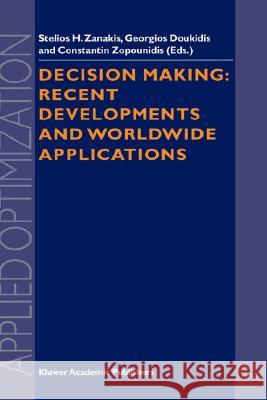Decision Making: Recent Developments and Worldwide Applications » książka
Decision Making: Recent Developments and Worldwide Applications
ISBN-13: 9780792366218 / Angielski / Twarda / 2000 / 494 str.
This chapter describes a study conducted at the Swinburne University of Technology in Australia, in their School of Business. The study was to explore the applicability of a judgment-analytic decision support system to the assessment of the likelihood of an applicant being selected for admission to the School's Graduate Certificate in Business Administration (GCBA) program. The likelihood of a program administrator selecting a particular applicant is directly linked to the assessment of the likelihood of that applicant's success in the GCBA program. The purpose of this study, in effect, was to analyze the administrative judgment process in assessment of an applicant's likelihood of success in the program. THE PROCESS OF HUMAN JUDGMENT Human judgment is a process through which an individual uses social infonnation to make decisions. The social infonnation is obtained from an individual's environment and is interpreted through the individual's cognitive image of the environment. The. cognitive image provides a representation of the environment based on past experiences and training, and essentially predisposes the person to respond to social infonnation in predictable ways. An individual's policies or beliefs about the environment represent these patterns. Human judgments are based then upon one's interpretation of available infonnation. They are probability statements about one's environment and how one reacts to it. This condition leads to the human judgment process being inherently limited. It is fundamentally a covert process. It is seldom possible for an individual to accurately describe his or her judgment process accurately.











